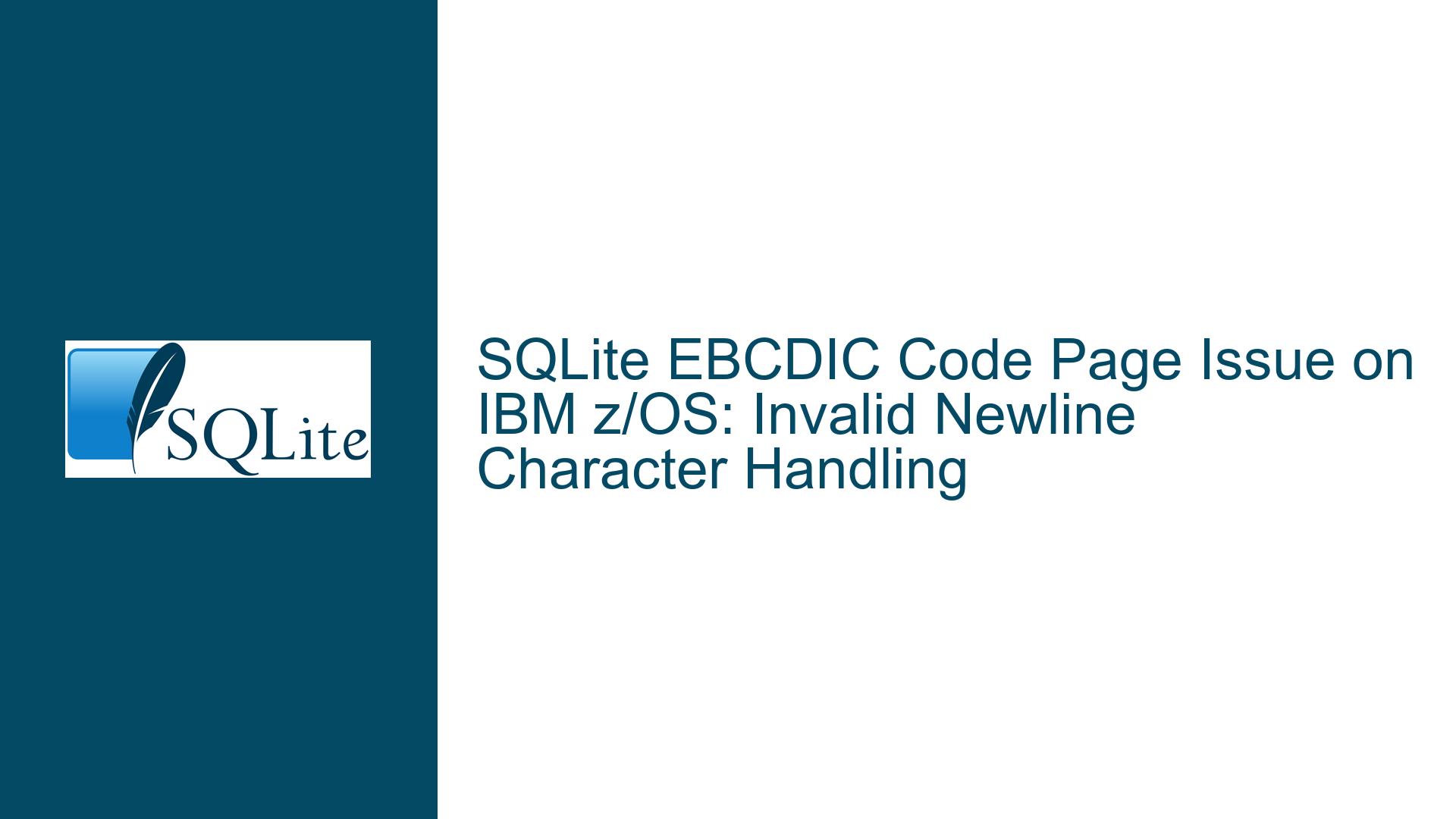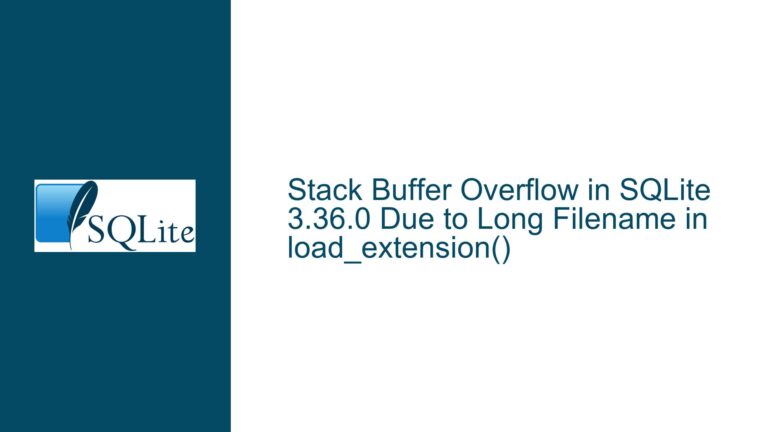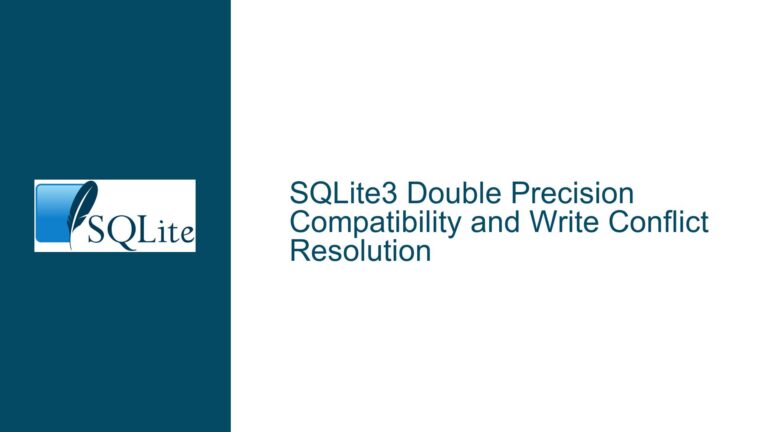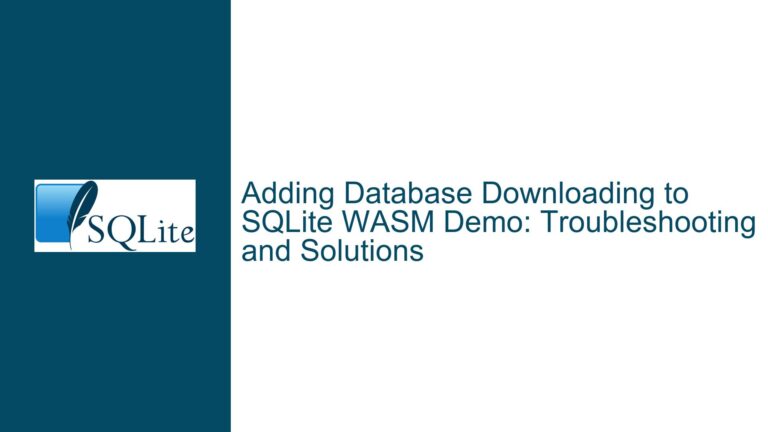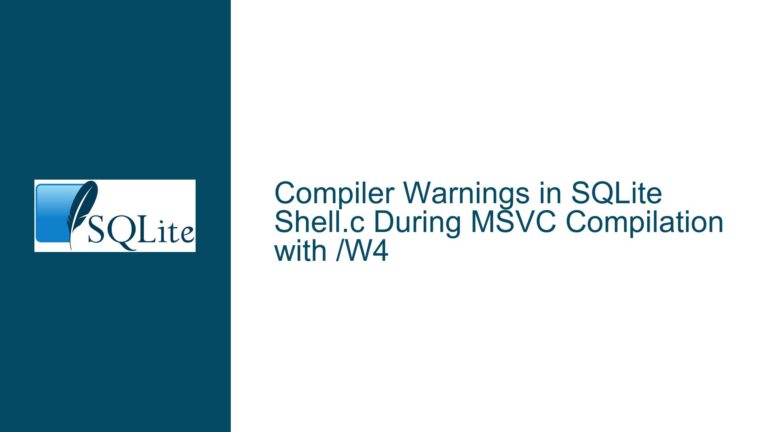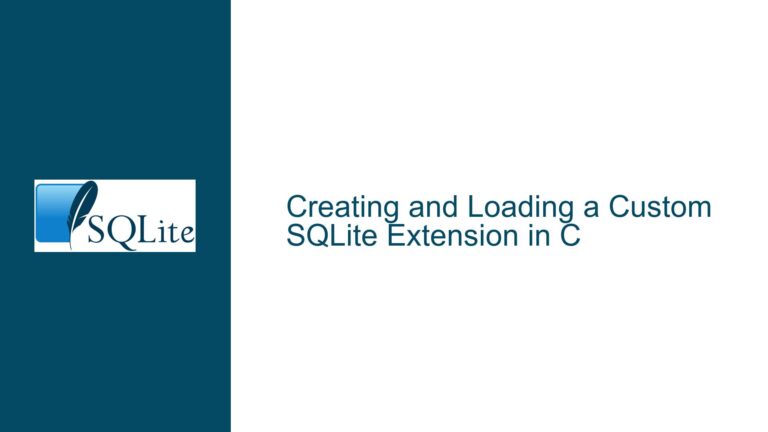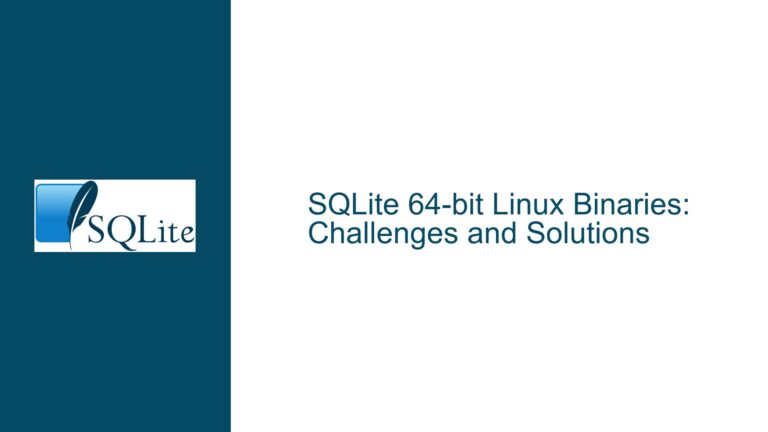SQLite EBCDIC Code Page Issue on IBM z/OS: Invalid Newline Character Handling
SQLite Rejects Valid Multi-Line SQL Statements on IBM z/OS
The core issue revolves around SQLite’s handling of the EBCDIC code page IBM-1047 on IBM z/OS mainframe systems. Specifically, SQLite incorrectly marks the code point 0x15 as invalid (CC_ILLEGAL) in its aiClass[] array, which is used to classify characters during SQL statement parsing. This code point, however, represents a valid newline character in the IBM-1047 code page. As a result, SQLite on z/OS rejects valid multi-line SQL statements that contain this character, leading to unexpected behavior and errors during query execution.
The aiClass[] array is a critical component of SQLite’s lexical analysis system. It maps each possible byte value (0x00 to 0xFF) to a character class, such as whitespace, alphabetic, numeric, or illegal. The classification determines how SQLite processes characters during SQL statement parsing. For example, whitespace characters (CC_SPACE) are ignored, while illegal characters (CC_ILLEGAL) cause the parser to reject the input.
In the IBM-1047 code page, the code point 0x15 is a valid newline character, which is essential for formatting multi-line SQL statements. However, SQLite’s EBCDIC implementation incorrectly classifies this code point as CC_ILLEGAL, causing the parser to reject any SQL statement containing it. This issue is particularly problematic for z/OS users who rely on multi-line SQL statements for complex queries or database maintenance tasks.
The proposed fix involves modifying the aiClass[] array to correctly classify the code point 0x15 as CC_SPACE (whitespace) in the EBCDIC implementation. This change ensures that SQLite on z/OS properly handles multi-line SQL statements containing the IBM-1047 newline character. The fix is minimal and only affects the EBCDIC implementation, leaving other platforms and code pages unchanged.
Incorrect Classification of Code Point 0x15 in EBCDIC Implementation
The root cause of the issue lies in SQLite’s EBCDIC-specific implementation of the aiClass[] array. The array is defined in the SQLite source code and maps each byte value to a character class. For EBCDIC systems, the array is tailored to the specific code page in use, in this case, IBM-1047. However, the array incorrectly classifies the code point 0x15 as CC_ILLEGAL, despite it being a valid newline character in IBM-1047.
The aiClass[] array is initialized with a series of values that correspond to character classes. Each value represents a specific class, such as CC_ILLEGAL (0x28), CC_SPACE (0x07), or CC_ALPHA (0x26). The array is indexed by the byte value of the character, and the corresponding value determines how SQLite processes the character during parsing. For example, a value of 0x07 (CC_SPACE) indicates that the character is whitespace and should be ignored, while a value of 0x28 (CC_ILLEGAL) indicates that the character is invalid and should cause the parser to reject the input.
In the case of code point 0x15, the array incorrectly assigns it a value of 0x28 (CC_ILLEGAL), causing SQLite to reject any SQL statement containing this character. This is particularly problematic for z/OS users, as the IBM-1047 code page uses 0x15 as a newline character, which is commonly used in multi-line SQL statements. The incorrect classification effectively breaks the parsing of such statements, leading to errors and unexpected behavior.
The issue is further compounded by the fact that SQLite’s EBCDIC implementation is not as widely tested or used as its ASCII counterpart. As a result, subtle issues like this can go unnoticed for extended periods, especially in niche environments like IBM z/OS. The fix proposed by Mario Bezzi addresses this issue by updating the aiClass[] array to correctly classify code point 0x15 as CC_SPACE (0x07) in the EBCDIC implementation.
Updating aiClass[] Array to Correctly Handle IBM-1047 Newline Character
The solution to this issue involves modifying the aiClass[] array in SQLite’s EBCDIC implementation to correctly classify the code point 0x15 as CC_SPACE (0x07). This change ensures that SQLite on z/OS properly handles multi-line SQL statements containing the IBM-1047 newline character. The fix is minimal and only affects the EBCDIC implementation, leaving other platforms and code pages unchanged.
The proposed change involves updating a single line in the aiClass[] array initialization. Specifically, the value at index 0x15 is changed from 0x28 (CC_ILLEGAL) to 0x07 (CC_SPACE). This change ensures that SQLite treats the IBM-1047 newline character as whitespace, allowing it to be ignored during parsing. The updated array initialization is as follows:
#ifdef SQLITE_EBCDIC
/* x0 x1 x2 x3 x4 x5 x6 x7 x8 x9 xa xb xc xd xe xf */
/* 0x */ 29, 28, 28, 28, 28, 7, 28, 28, 28, 28, 28, 28, 7, 7, 28, 28,
/* 1x */ 28, 28, 28, 28, 28, 7, 28, 28, 28, 28, 28, 28, 28, 28, 28, 28,
/* 2x */ 28, 28, 28, 28, 28, 7, 28, 28, 28, 28, 28, 28, 28, 28, 28, 28,
/* 3x */ 28, 28, 28, 28, 28, 28, 28, 28, 28, 28, 28, 28, 28, 28, 28, 28,
/* 4x */ 7, 28, 28, 28, 28, 28, 28, 28, 28, 28, 28, 26, 12, 17, 20, 10,
The change is straightforward and only affects the EBCDIC implementation of SQLite. It does not impact other platforms or code pages, ensuring that the fix is both targeted and safe. Once applied, SQLite on z/OS will correctly handle multi-line SQL statements containing the IBM-1047 newline character, resolving the issue and restoring expected behavior.
In addition to applying the fix, it is recommended that users on IBM z/OS systems ensure they are using the latest version of SQLite that includes this patch. The SQLite development team has confirmed that the fix has been incorporated into the trunk and will be included in an upcoming patch release. Users should monitor the SQLite website or their package manager for updates and apply them as soon as they become available.
For users who are unable to update SQLite immediately, a temporary workaround is to avoid using multi-line SQL statements that contain the IBM-1047 newline character. Instead, users can format their SQL statements as a single line or use alternative whitespace characters that are correctly classified by SQLite. While this workaround is not ideal, it can help mitigate the issue until the fix is applied.
In conclusion, the issue of SQLite rejecting valid multi-line SQL statements on IBM z/OS due to the incorrect classification of the IBM-1047 newline character is a significant but easily resolved problem. By updating the aiClass[] array to correctly classify code point 0x15 as CC_SPACE, SQLite on z/OS can properly handle multi-line SQL statements, ensuring smooth and error-free operation. Users are encouraged to apply the fix as soon as it becomes available and to monitor for updates from the SQLite development team.
